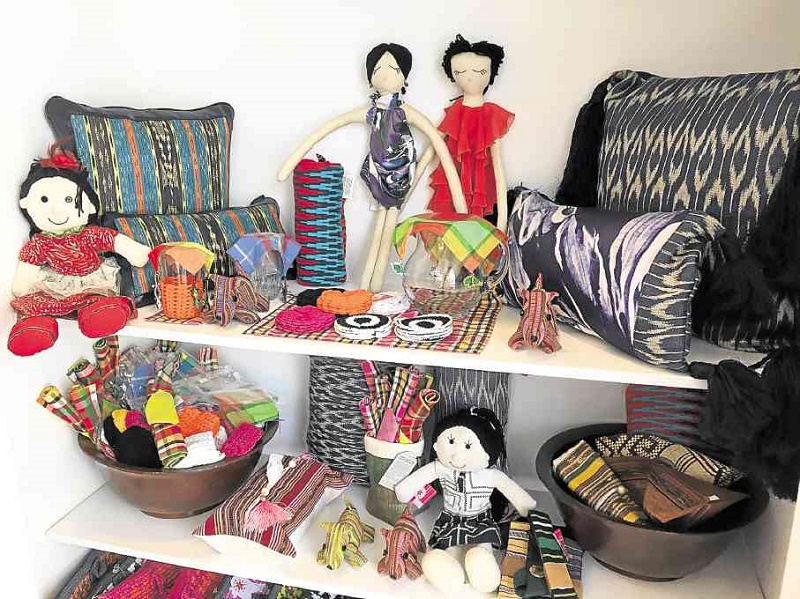
GREAT Women sells products that preserve Filipino culture and tradition and promote women-related advocacies.
Four years ago, three businesswomen decided to spearhead a program to help their fellow female entrepreneurs, particularly those from underprivileged communities, find access to a bigger market for their products.
Since then, the “Echotrio”—Echostore and Echosi Foundation’s Jeannie Javelosa, Chit Juan and Reena Francisco—have not stopped helping microentrepreneurs through the public-private partnership project Great Women (GW). Last month, their hard work and perseverance paid off as GW was finally able to open its own store and cafe in Makati City.
For sale inside the GW Showroom & Cafe, which is located beside Tesoro’s handicrafts store along A. Arnaiz Avenue (and just meters away from Glorietta 2), are the “responsible luxury” products, which were developed by the women microentrepreneurs the three friends have tapped. Items sell for as low as P50 to as high as P15,000.
The cafe also serves as a space for women, says Javelosa. It serves, aside from tea and coffee, light fare such as sandwiches and pasta, and also wine, “since we know women like to drink wine. You can come here, use this as your office. We’re like a club here.”
“The food is what women like to eat; it’s not pretentious,” adds Carlota Manalo-Tan, who recently joined the GW project as the cafe’s director of operations and finance.
The GW Showroom & Cafe is part of the project’s second phase. It is funded by the Canadian government, which provided around P275 million for the project to continue until 2020, says Luvy Villanueva, project manager of the Philippine Commission on Women (PCW), GW’s government partner which connected Echosi Foundation to the different microentrepreneurs.
The first phase, which was also funded by the Canadian government for a little over P215 million, concentrated more on helping the microentrepreneurs with their product development and design and to make their creations more “marketable.”
“After that, we needed a place to sell [these products]. That’s where this showroom came in,” says Tan.
“This is our lab,” Javelosa adds.
To build GW as a responsible luxury brand, Javelosa says they chose to concentrate on creating lifestyle items: Apparel and bags using indigenous textiles, hand-poured candles, accessories with designs inspired by traditional weaves.
“Echostore is more on green, organic. GW is more for women—but not necessarily green,” Javelosa says. “So we had to go in a different direction so as not to bastardize each other.”
For the current phase, Javelosa says they also connected the different women’s cooperatives—the local artisans from poor communities—to a women’s collective, composed of more established producers, manufacturers, retailers and designers.
“[The partners from the women collective] take charge of one or two communities,” says Javelosa. Members of the women’s collective, which she heads, include Echostore, Anthill Fabric Gallery, Brownroots Creatives, GKonomics, Greenleaf Eco-Bags, Ilaw ng Tahanan, Nooks, QPELA, Tadeco, The Leather Collection, Le Mar Enterprises, jewelry designer Wynn Wynn Ong, fashion designer Happy Andrada and bag designer Zarah Juan.
“We’re trying to make the products more modern and to connect them with more popular designers so they’ll be easier to market,” says Tan.
This, while keeping in mind their products should always be rooted in preserving cultural traditions and promoting women-related advocacies. Under GW’s Legacy collection, for example, original beadwork and textile designs of Bagobo-Tagabawa tribes are used for espadrilles, while their textiles are mixed with fine leather to create different kinds of bags.
GW’s Neo-ethnic collection, on the other hand, uses T’boli textiles to create apparel suitable for everyday wear.
“We’ll be launching dolls handmade by stay-at-home moms in Cebu, which is overseen by Anthill [Fabric Gallery]. A percentage of the sales goes to GW’s sales group, while a percentage goes to our human-rights advocacy, which is [helping victims of] incest and rape,” says Javelosa. “So that falls under our Advocacy-Driven [collection].
As the GW brand continues to grow, Javelosa says they plan to roll out more affordable products, and possibly conduct GW tours to introduce more people to the microentrepreneurs.
“We’re all about traceability—artisan, handmade, the authenticity of our culture. It’s not just [about] fashion; of course, [the products] are beautiful, funky, but more than that, you can see the impact on the ground. We’re trying to not use synthetic dyes, [and we’re] trying to revive the cotton industry and trying to revive the textile industry. We’re trying a lot of things,” Javelosa says.